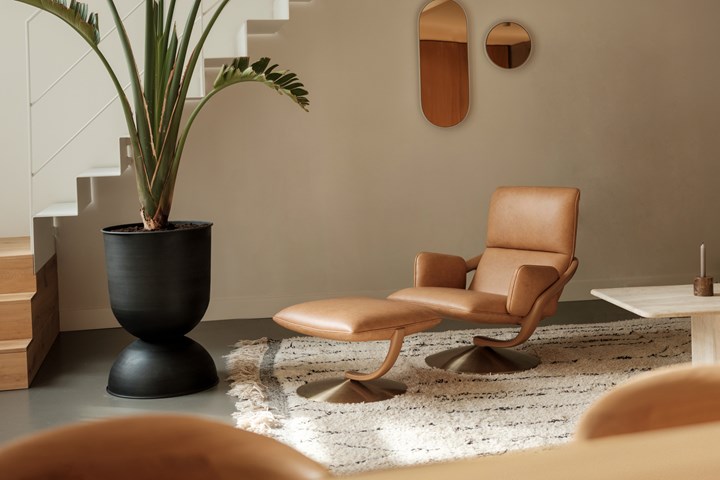Scandinavian-inspired Japanese furniture brand debuts customized carbon fiber lounge chair
Mishima’s lounge chair frame is constructed via AM from a single piece of continuous carbon fiber, originally developed for the rigors of aerospace.

Photo Credit, all images: Mishima
Mishima (Tokyo, Japan) is a Scandinavian-inspired Japanese furniture brand that uses additive manufacturing (AM) techniques and advanced carbon fiber composite materials to make on-demand custom order furniture for modern tastes. On Nov. 2 the company unveiled its flagship product, a custom-made lounge chair and ottoman supported by a single carbon fiber composite structure.
The Mishima Lounge Chair and Ottoman touts a true unibody construction, 3D manufactured with a single pass of continuous carbon fiber thermoplastic composite. Its signature support structure is made without joints or glue with aerospace-grade ultra-high modulus carbon fiber for high strength to support the chair; it also passes stringent ANSI/BIFMA durability and safety standards.
“The distinct engineering and materials used for Mishima brings the body into nearly weightless sensation,” describes Sonny Vu, CEO of Mishima. “It’s perfectly angled for comfort and its strong, physics-defying core allows the body to have a feeling of undisturbed floating in mid-air.”

Mishima says customers can choose from a curated selection of high-quality luxurious fabrics and supple leathers in a variety of premium shades. In addition, Mishima’s base and shell can be customized with either matte or metallic finishes in jeweled hues, including a special edition, 24K gold polished finish. There are nearly 250 possible combinations to choose from, the company adds.
The first 500 Mishima Lounge Chairs and Ottomans made will make up the Founder’s Series, Mishima says. Units can be configured, visualized with augmented reality and purchased online at www.mishima.studio, with the first 50 units available for immediate shipment.
Related Content
-
A new era for ceramic matrix composites
CMC is expanding, with new fiber production in Europe, faster processes and higher temperature materials enabling applications for industry, hypersonics and New Space.
-
3D-printed CFRP tools for serial production of composite landing flaps
GKN Aerospace Munich and CEAD develop printed tooling with short and continuous fiber that reduces cost and increases sustainability for composites production.
-
TU Munich develops cuboidal conformable tanks using carbon fiber composites for increased hydrogen storage
Flat tank enabling standard platform for BEV and FCEV uses thermoplastic and thermoset composites, overwrapped skeleton design in pursuit of 25% more H2 storage.














.jpg;maxWidth=300;quality=90)
